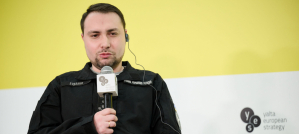Yalta European Strategy (YES) Held Online Conversation with Steve Biegun on Ukraine’s Reform, Security, and Euro-Atlantic Integration Perspectives
On October 2, 2020, Yalta European Strategy in partnership with the Victor Pinchuk Foundation held the first YES online conversation entitled «Ukraine’s reform, security, and Euro-Atlantic integration perspectives».
Stephen Biegun, U.S. Deputy Secretary of State was interviewed by Anne Applebaum, Pulitzer Prize-winning author. YES board member Carl Bildt, Minister for Foreign Affairs of Sweden (2006-2014), Prime Minister of Sweden (1991-1994), opened the conversation.
In his introductory remarks, Stephen Biegun said: “One month ago I visited Ukraine, and during my few days in Kyiv, I had a chance to sit down with a number of officials. We reviewed the state of reforms, what President Zelenskyy and the Prime Minister are seeking to do.” He said he also met with non-governmental representatives supporting the anti-corruption agenda “to hear some of the challenges that they continue to face.” He concluded: “The visit left me quite optimistic about the future of Ukraine.”
Speaking of the cooperation between Ukraine and the current administration, Deputy Secretary Biegun said: “We are quite proud of our record about Ukraine. We have delivered more than 2 billion dollars in security assistance to Ukraine. This administration has strongly supported the professionalization of Ukrainian armed forces and its improved capacities. The assistance includes lethal military assistance. (...) I and all the American officials working closely with Ukraine expect only more good things coming from this relationship. We are certainly much better off than we were 4 years ago.”
The speaker commented on one of Ukraine’s pressing challenges, corruption: “We continue to be concerned about corruption in Ukraine. President Zelenskyy is taking it on as a high governing priority, but that does not make it easy to resolve those issues, and those issues remain out there. We all have to join hands with the Ukrainian people to turn back.”
Answering Anne Applebaum’s question about the prospects of continuity in the US Ukraine policy after the forthcoming election in America, Stephen Biegun stressed: “Whether on the personal side or on the policy side, there is a great harmony on issues related to the US-Ukraine relations. In terms of the policy that the United States has towards Ukraine, I expect it to be consistent. I am sure that the next president of the United States (...) will continue to fully support the Ukrainian government.”
On perspectives for peace in Ukraine, Deputy Secretary Biegun said: “The Minsk 2 Agreement and the Normandy Group are still relevant, they may not be perfect, but they are the tools that we have. We still have to find ways to use those with US engagement and US support. The Ukrainian government’s move to put in place a more durable ceasefire is an important first step. (...) The ceasefire is necessary to have a reduction in violence and tensions, sufficient to take the other steps that are going to be necessary to really regain Ukrainian sovereignty over this territory. I think that early and high priority has to be security in Eastern Ukraine. That means some kind of control over the border of Ukraine. So that other conditions can develop, including the holding of elections. And finally, and most importantly, and the US, the EU and the international institutions have a strong role to play – we need a strong financial package, as a strong incentive that shows all the people of Ukraine, including those living in the Donbas, that they are all part of Ukraine that can be prosperous and successful.” He concluded: “The Russian side has to understand that the sanctions will not be lifted. Those may even worsen, if the Russian government does not engage in a constructive honest diplomatic process to return the sovereignty of Ukraine in the Donbas.”
The interlocutors also touched upon the recent events in Belarus as well as the poisoning of Alexey Navalny, Russia’s role and US-Russian relations.
Carl Bildt, opening the conversation as member of the YES board, presented the YES online discussions. “At these times, as it is not possible to meet as we did in Yalta or Kyiv. We aim to bridge that gap with these online conversations until we will be able to meet in person in Kyiv again in September of next year. A number of online conversations will be organized. This is the first one, and more will follow”, Mr. Bildt said.
The YES Annual Meeting 2020 was postponed due to the COVID-19 pandemic. YES and the Victor Pinchuk Foundation remain committed to integrating Ukraine with the world and put the country on the international agenda. Since 2004, Yalta European Strategy has been the main non-governmental platform for connecting the world and Ukraine. The YES Annual Meetings have brought together world political, business and thought leaders to discuss Ukraine’s future and pressing global challenges.
The video of the event is available at link: https://youtu.be/08uul3uIIqQ.
←Back to news list

